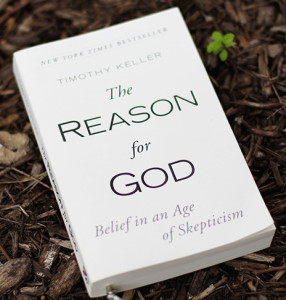A few weeks ago, I finished up Dr. Tim Keller’s book The Reason for God. I have spent a long time in conversation discussing this book with friends, but am just now getting around to typing up my notes. This book is an excellent tool written specifically to address the skepticism that some people have about Christianity, about Jesus, or maybe just about the Bible itself. Keller takes several conversations he has had over the years and turns them into an excellent conversation to have with someone that has questions about their faith. This book is full of Scripture and oozes grace. This book won’t cause an argument, but rather equips the reader with the knowledge and understanding of the gospel in such a way as to win a lost person to Christ. I have already purchased a few copies of this book and given them away…and intend to buy more! This is a great tool to have on hand, especially in my role as a high school principal serving students that tend to have really great questions about faith. I highlighted several things while reading and have posted those notes below…
- We have come to a cultural moment in which both skeptics and believers feel their existence is threatened because both secular skepticism and religious faith are on the rise in significant, powerful ways. We have neither the Western Christendom of the past nor the secular, religionless society that was predicted for the future. We have something else entirely.
- The population is paradoxically growing both more religious and less religious at once.
- Believers should acknowledge and wrestle with doubts—not only their own but their friends’ and neighbors’. It is no longer sufficient to hold beliefs just because you inherited them. Only if you struggle long and hard with objections to your faith will you be able to provide grounds for your beliefs to skeptics, including yourself, that are plausible rather than ridiculous or offensive. And, just as important for our current situation, such a process will lead you, even after you come to a position of strong faith, to respect and understand those who doubt.
- Christianity has within itself remarkable power to explain and expunge the divisive tendencies within the human heart.
- The death of Jesus was qualitatively different from any other death. The physical pain was nothing compared to the spiritual experience of cosmic abandonment. Christianity alone among the world religions claims that God became uniquely and fully human in Jesus Christ and therefore knows firsthand despair, rejection, loneliness, poverty, bereavement, torture, and imprisonment. On the cross he went beyond even the worst human suffering and experienced cosmic rejection and pain that exceeds ours as infinitely as his knowledge and power exceeds ours. In his death, God suffers in love, identifying with the abandoned and god-forsaken. Why did he do it? The Bible says that Jesus came on a rescue mission for creation. He had to pay for our sins so that someday he can end evil and suffering without ending us.
- Embracing the Christian doctrines of the incarnation and Cross brings profound consolation in the face of suffering. The doctrine of the resurrection can instill us with a powerful hope. It promises that we will get the life we most longed for, but it will be an infinitely more glorious world than if there had never been the need for bravery, endurance, sacrifice, or salvation.
- “They say of some temporal suffering, ‘No future bliss can make up for it,’ not knowing that Heaven, once attained will work backwards and turn even that agony into a glory.” C.S. Lewis, The Great Divorce
- If we only grow intellectually, vocationally, and physically through judicious constraints—why would it not also be true for spiritual and moral growth? Instead of insisting on freedom to create spiritual reality, shouldn’t we be seeking to discover it and disciplining ourselves to live according to it?
- Freedom is not the absence of limitations and constraints, but it is finding the right ones, those that fit our nature and liberate us.
- What strikes us as overly fanatical is actually a failure to be fully committed to Christ and his gospel.
- If we are saved by sheer grace we can only become grateful, willing servants of God and of everyone around us. Jesus charged his disciples: “Whoever wants to be great among you must be your servant, and whoever wants to be first must be servant of all” (Matthew 10:43-45)
- Dr. Martin Luther King, Jr. invoked the prophet Amos, who said, “Let justice roll down like waters, and righteousness as a mighty stream” (Amos 5:24). The greatest champion of justice in our era knew the antidote to racism was not less Christianity, but a deeper and truer Christianity.
- Why should Western cultural sensibilities be the final court in which to judge whether Christianity is valid?
- For the sake of argument, let’s imagine that Christianity is not the product of any one culture but is actually the transcultural truth of God. If that were the case we would expect that it would contradict and offend every human culture at some point, because human cultures are ever-changing and imperfect. If Christianity were the truth it would have to be offending and correcting your thinking at some place. Maybe this is the place, the Christian doctrine of divine judgement.
- Even though the concept of warfare between science and religion still has much popular credence, we should disabuse ourselves of the notion that we have to choose between the two, or that if you want to be a Christian you will have to be in conflict with science. A majority of scientists consider themselves deeply or moderately religious—and those numbers have increased in recent decades. There is no necessary disjunction between science and devout faith.
- Jesus’s miracles are not just a challenge to our minds, but a promise to our hearts, that the world we all want is coming.
- If you dive into the shallow end of the Biblical pool, where there are many controversies over interpretation, you may get scraped up. But if you dive into the center of the Biblical pool, where there is consensus—about the deity of Christ, his death and resurrection—you will be safe. It is therefore important to consider the Bible’s core claims about who Jesus is and whether he rose from the dead before you reject it for its less central and more controversial teachings.
- If we let our unexamined beliefs undermine our confidence in the Bible, the cost may be greater than we think. If you don’t trust the Bible enough to let it challenge and correct your thinking, how could you ever have a personal relationship with God?
- Come, let us argue it out. Isaiah 1:18
- If there is no God, then there is no way to say any one action is “moral” and another “immoral”, but only, “I like this.”
- Sin is the despairing refusal to find your deepest identity in your relationship and service to God. Sin is seeking to become oneself, to get an identity, apart from him.
- Identity apart from God is inherently unstable.
- “Only if God is our summum bonum, our ultimate good and life center, will we find our heart drawn out not only to people of all families, races, and classes, but to the whole world in general.” Jonathan Edwards, The Nature of True Virtue
- Everybody has to live for something. Whatever that something is becomes “Lord of your life,” whether you think of it that way or not. Jesus is the only Lord who, if you receive him, will fulfill you completely, and if you fail him, will forgive you eternally.
- The fact that Jesus had to die for me humbled me out of my pride. The fact that Jesus was glad to die for me assured me out of my fear.
- Outside of the Bible, no other major religious faith holds out any hope or even interest in the restoration of perfect shalom, justice, and wholeness in this material world.



